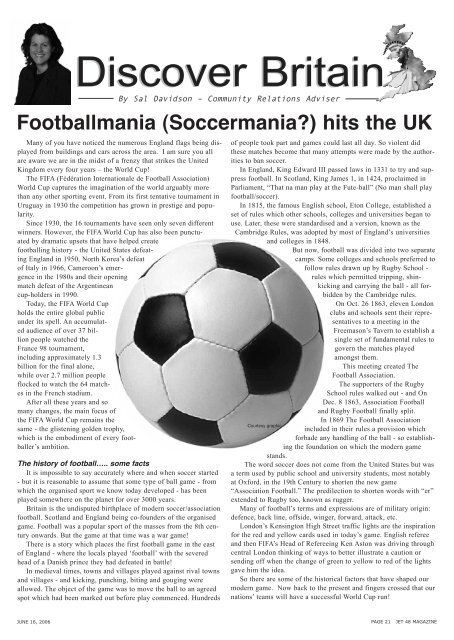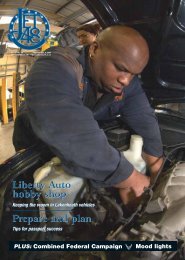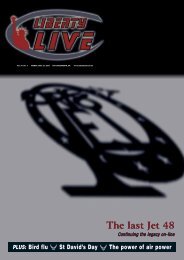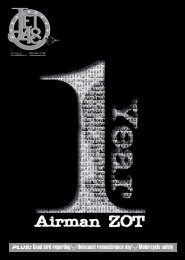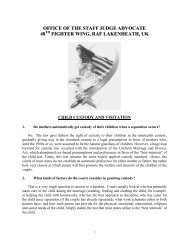Class of 2006 dismissed - RAF Lakenheath
Class of 2006 dismissed - RAF Lakenheath
Class of 2006 dismissed - RAF Lakenheath
Create successful ePaper yourself
Turn your PDF publications into a flip-book with our unique Google optimized e-Paper software.
By Sal Davidson – Community Relations Adviser<br />
Footballmania (Soccermania) hits the UK<br />
Many <strong>of</strong> you have noticed the numerous England flags being displayed<br />
from buildings and cars across the area. I am sure you all<br />
are aware we are in the midst <strong>of</strong> a frenzy that strikes the United<br />
Kingdom every four years – the World Cup!<br />
The FIFA (Fédération Internationale de Football Association)<br />
World Cup captures the imagination <strong>of</strong> the world arguably more<br />
than any other sporting event. From its first tentative tournament in<br />
Uruguay in 1930 the competition has grown in prestige and popularity.<br />
Since 1930, the 16 tournaments have seen only seven different<br />
winners. However, the FIFA World Cup has also been punctuated<br />
by dramatic upsets that have helped create<br />
footballing history - the United States defeating<br />
England in 1950, North Korea’s defeat<br />
<strong>of</strong> Italy in 1966, Cameroon’s emergence<br />
in the 1980s and their opening<br />
match defeat <strong>of</strong> the Argentinean<br />
cup-holders in 1990.<br />
Today, the FIFA World Cup<br />
holds the entire global public<br />
under its spell. An accumulated<br />
audience <strong>of</strong> over 37 billion<br />
people watched the<br />
France 98 tournament,<br />
including approximately 1.3<br />
billion for the final alone,<br />
while over 2.7 million people<br />
flocked to watch the 64 matches<br />
in the French stadium.<br />
After all these years and so<br />
many changes, the main focus <strong>of</strong><br />
the FIFA World Cup remains the<br />
same - the glistening golden trophy,<br />
which is the embodiment <strong>of</strong> every footballer’s<br />
ambition.<br />
The history <strong>of</strong> football….. some facts<br />
It is impossible to say accurately where and when soccer started<br />
- but it is reasonable to assume that some type <strong>of</strong> ball game - from<br />
which the organised sport we know today developed - has been<br />
played somewhere on the planet for over 3000 years.<br />
Britain is the undisputed birthplace <strong>of</strong> modern soccer/association<br />
football. Scotland and England being co-founders <strong>of</strong> the organised<br />
game. Football was a popular sport <strong>of</strong> the masses from the 8th century<br />
onwards. But the game at that time was a war game!<br />
There is a story which places the first football game in the east<br />
<strong>of</strong> England - where the locals played ‘football’ with the severed<br />
head <strong>of</strong> a Danish prince they had defeated in battle!<br />
In medieval times, towns and villages played against rival towns<br />
and villages - and kicking, punching, biting and gouging were<br />
allowed. The object <strong>of</strong> the game was to move the ball to an agreed<br />
spot which had been marked out before play commenced. Hundreds<br />
<strong>of</strong> people took part and games could last all day. So violent did<br />
these matches become that many attempts were made by the authorities<br />
to ban soccer.<br />
In England, King Edward III passed laws in 1331 to try and suppress<br />
football. In Scotland, King James 1, in 1424, proclaimed in<br />
Parliament, “That na man play at the Fute-ball” (No man shall play<br />
football/soccer).<br />
In 1815, the famous English school, Eton College, established a<br />
set <strong>of</strong> rules which other schools, colleges and universities began to<br />
use. Later, these were standardised and a version, known as the<br />
Cambridge Rules, was adopted by most <strong>of</strong> England’s universities<br />
and colleges in 1848.<br />
But now, football was divided into two separate<br />
camps. Some colleges and schools preferred to<br />
follow rules drawn up by Rugby School -<br />
rules which permitted tripping, shinkicking<br />
and carrying the ball - all forbidden<br />
by the Cambridge rules.<br />
On Oct. 26 1863, eleven London<br />
clubs and schools sent their representatives<br />
to a meeting in the<br />
Freemason’s Tavern to establish a<br />
single set <strong>of</strong> fundamental rules to<br />
govern the matches played<br />
amongst them.<br />
This meeting created The<br />
Football Association.<br />
The supporters <strong>of</strong> the Rugby<br />
School rules walked out - and On<br />
Dec. 8 1863, Association Football<br />
and Rugby Football finally split.<br />
In 1869 The Football Association<br />
Courtesy graphic<br />
included in their rules a provision which<br />
forbade any handling <strong>of</strong> the ball - so establishing<br />
the foundation on which the modern game<br />
stands.<br />
The word soccer does not come from the United States but was<br />
a term used by public school and university students, most notably<br />
at Oxford, in the 19th Century to shorten the new game<br />
“Association Football.” The predilection to shorten words with “er”<br />
extended to Rugby too, known as rugger.<br />
Many <strong>of</strong> football’s terms and expressions are <strong>of</strong> military origin:<br />
defence, back line, <strong>of</strong>fside, winger, forward, attack, etc.<br />
London’s Kensington High Street traffic lights are the inspiration<br />
for the red and yellow cards used in today’s game. English referee<br />
and then FIFA’s Head <strong>of</strong> Refereeing Ken Aston was driving through<br />
central London thinking <strong>of</strong> ways to better illustrate a caution or<br />
sending <strong>of</strong>f when the change <strong>of</strong> green to yellow to red <strong>of</strong> the lights<br />
gave him the idea.<br />
So there are some <strong>of</strong> the historical factors that have shaped our<br />
modern game. Now back to the present and fingers crossed that our<br />
nations’ teams will have a successful World Cup run!<br />
JUNE 16, <strong>2006</strong><br />
PAGE 21<br />
JET 48 MAGAZINE


